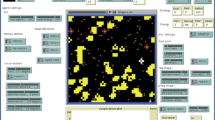Abstract
The “Tragedy of the Commons” (TOC) is a problem in which the sustainability of the society (group of agents) reduces due to self-interested individual agents. Many areas of interest to society like climate change, fisheries management, preservation of rainforests exhibit this phenomenon. We have focused on understanding what is the degree of sacrifice that an agent can make so that the sustainability of the society can be extended. For this we first make a mathematical modeling of the TOC dilemma. Next we propose three types of algorithms corresponding to the different behaviors of the agents. First we assume that the agents are interested in their individual gains only. In this case the society survives for the least amount of time. In the second approach we assume that the agents make decisions based on the resource availability, individual gains or a combination of both. Here an agent’s behavior takes into account the welfare of the society to some extent. Thus now the society survives for a longer period of time compared to that in the previous case. In the third approach we define a measure of social awareness of the agents. This measure is indicative of the degree of sacrifice the agent is willing to make. Now the society performs considerably better than the second case. We have experimentally validated these results. Our study shows that if the agents are willing to sacrifice for some period of time, the sustainability of the society increases considerably.
Access this chapter
Tax calculation will be finalised at checkout
Purchases are for personal use only
Preview
Unable to display preview. Download preview PDF.
Similar content being viewed by others
References
Sen, O., Sen, S.: Averting the tragedy of commons by adaptive aspiration levels. In: PRIMA, pp 355–370 (2010)
Saha, S., Sen, S.: Local decisions procedures for avoiding the tragedy of commons. In: Das, S.R., Das, S.K. (eds.) IWDC 2003. LNCS, vol. 2918, pp. 311–320. Springer, Heidelberg (2003)
Hardin, G.: The Tragedy of the Commons. Science 162(3859), 1243–1248 (1968)
Turner, R.M.: The tragedy of the commons and distributed AI systems. In: 12th International Workshop on Distributed AI, pp. 379–390 (1993)
Hogg, L.M.J., Jennings, N.R.: Socially Intelligent Reasoning for Autonomous Agents. IEEE Trans. SMC(A) 31(5), 381–393 (2001)
Lopez, L., Almansa, G.D.R., Paquelet, S., Fernandez, A.: A mathematical model for the TCP Tragedy of the Commons. Theoretical Computer Science 343(1–2) (2005)
Diekert, F.K.: The tragedy of the commons from a game-theoretic perspective. Sustainability 4, 1776–1786 (2012)
Killingback, T., Doebeli, M., Hauert, C.: Diversity of cooperation in the Tragedy of Commons. Biological Theory 5, 3–6 (2010)
Doebeli, M., Hauert, C.: Models of cooperation based on the Prisoner’s dilemma and the snowdrift game. Ecology Letters 8, 748–766 (2005)
Castelfranchi, C.: Modeling social action of AI agents. Artificial Intelligence 103(1–2) (1998)
Milinsky, M., Semmann, D., Krambeck, H.-J.: Reputation helps solve the ‘tragedy of the commons’. Letters to Nature, Nature 415, 424–426 (2002)
Senge, P., Kleiner, A., Roberts, C., Ross, R., Smith, B.: The Fifth Discipline Fieldbook. Doubleday, New York (1994)
Braun, W.: The System Archetypes (2002)
Wilensky, U.: NetLogo. Center for connected learning and computer-based modelling (CCL). Northwestern University, USA. http://ccl.northwestern.edu/netlogo/
MadKIT. http://www.madkit.org/
Pseudo-random numbers. http://www.cplusplus.com/reference/random/
Author information
Authors and Affiliations
Corresponding author
Editor information
Editors and Affiliations
Rights and permissions
Copyright information
© 2015 Springer International Publishing Switzerland
About this paper
Cite this paper
Akarsh, S., Niyogi, R., Milani, A. (2015). Modeling Socially Synergistic Behavior in Autonomous Agents. In: Gervasi, O., et al. Computational Science and Its Applications -- ICCSA 2015. ICCSA 2015. Lecture Notes in Computer Science(), vol 9156. Springer, Cham. https://doi.org/10.1007/978-3-319-21407-8_20
Download citation
DOI: https://doi.org/10.1007/978-3-319-21407-8_20
Published:
Publisher Name: Springer, Cham
Print ISBN: 978-3-319-21406-1
Online ISBN: 978-3-319-21407-8
eBook Packages: Computer ScienceComputer Science (R0)




